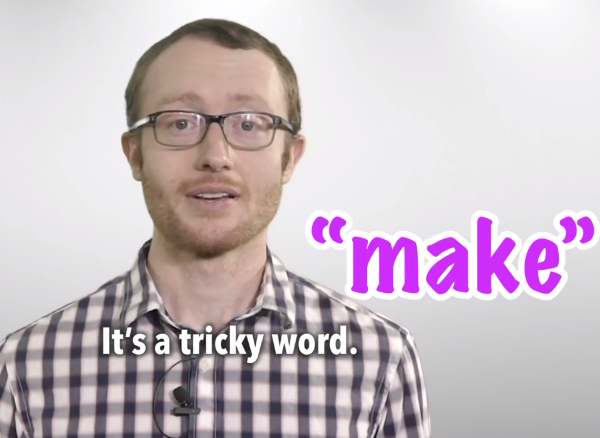This is Everyday Grammar. I'm John Russell.
这里是《每日语法》节目。我是约翰·罗素。
Let's talk about the verb "make".
让我们聊聊“制作”这个词。
It's a tricky word.
这是个有点麻烦的词。
The literal meaning of make is "to produce or create something".
它的字面意思是“制作或创作某物”。
However, this meaning is not common in everyday speech.
然后,在日常用语中这个意思并不常见。
Let's talk about one common meaning of "make": to plan or decide to do something.
我们来说说“make”一个常用的意思:计划或决定做某事。
When it has this meaning, "make" is often followed by a noun phrase.
当它作这个意思使用时,它的后面经常接名词短语。

Here's an example.
举个例子。
I recently tried to see my dentist.
我最近想去看牙医。
While calling to schedule an appointment, I realized how often I used the verb "make".
当我打电话预约时,我意识到我使用动词“make”多么频繁。
Good morning, this is Doctor Bob's office.
早上好,这里是鲍勃医生的办公室。
Good morning, this is John Russell.
早上好,我是约翰·罗素。
I'd like to make an appointment with Doctor Bob.
我想跟鲍勃医生预约一下。
I'm sorry, he's not available until Friday.
不好意思,他要到周五才有空了。
How about this Friday?
这周五可以吗?
I don't think that will work - I've already made plans to go out of town!
我觉得不行,我已经计划要出城去!
In the example, you heard me use the verb "make" with a noun phrase - make an appointment.
在这个例子中,你听到我使用“make”时在后面接名词短语——预约。
You also heard me use the past tense, as in "made plans".
你还听到我使用了过去时——制定计划。
"Make" plus a noun phrase is a useful structure to know.
“make”加一个名字短语是一个很有用的结构。
You can make an appointment, make plans to do something, or make a decision to do something.
你可以预约、制定计划做某事或者决定做某事。
You will often hear English speakers talk about making plans with friends.
你会经常听到说英语的人说和朋友一起制定计划。
In the news, you might hear politicians or government officials talking about making a decision.
在新闻里,你可能会听到政党或者政府官员说做决定。
I will talk about other meanings of "make" in future videos.
在以后的视频里,我会说到“make”的其它意思。
But for now, I thank you for making a decision to watch this program.
但是现在,我想谢谢你决定收看这个节目。
And that's Everyday Grammar.
以上就是今天的《每日语法》。












